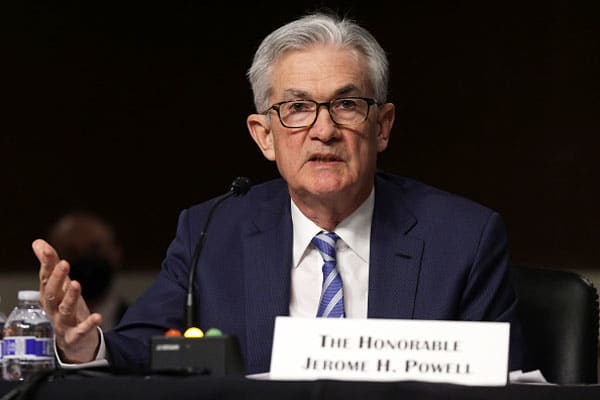U.S. Federal Reserve Board Chairman Jerome Powell speaks during his re-nominations hearing of the Senate Banking, Housing and Urban Affairs Committee on Capitol Hill, in Washington, U.S., January 11, 2022.
Graeme Jennings | Reuters
Federal Reserve Chairman Jerome Powell, with a seemingly clear path to a second term heading the central bank, declared Tuesday that the U.S. economy is both healthy enough and in need of tighter monetary policy.
As part of his confirmation hearing before the U.S. Senate Committee on Banking, Housing and Urban Affairs, Powell said he expects a series of interest rate hikes this year, along with other reductions in the extraordinary help the Fed has been providing during the pandemic era.
“As we move through this year … if things develop as expected, we’ll be normalizing policy, meaning we’re going to end our asset purchases in March, meaning we’ll be raising rates over the course of the year,” he told committee members. “At some point perhaps later this year we will start to allow the balance sheet to run off, and that’s just the road to normalizing policy.”
He made the remarks during a 2½-hour session that included both praise for the Fed’s handling of the economy and criticism over perceived ethical lapses from central bank officials. Some Republican senators also expressed worries over whether the Fed was veering too far from its stated objectives of price stability, full employment and banking oversight.
Ultimately, though, Powell appeared headed toward a successful confirmation from the full Senate. Committee Chairman Sherrod Brown, D-Ohio, and Pennsylvania Sen. Patrick Toomey, the ranking Republican, both said they plan on supporting President Joe Biden’s nomination. Sen. Elizabeth Warren, D-Mass., has said she will oppose the nomination, after calling Powell “dangerous” during a hearing last year.
Many of the questions from both sides of the aisle centered on inflation, which is running at a close to 40-year high. After declaring the surge “transitory” for much of 2021, the Fed has pivoted on inflation and is expected to raise rates three or four times this year in quarter percentage-point increments.
Higher interest rates control inflation by slowing down the flow of money, which has been running rapidly through the economy as the Fed and Congress have combined to provide more than $10 trillion worth of stimulus.
“If we see inflation persisting at high levels longer than expected, then if we have to raise interest more over time, we will,” Powell said. “We will use our tools to get inflation back.”
Supporting jobs, fighting inflation
In addition to rate hikes, the Fed also is tapering its monthly bond purchases, which have added more than $4.5 trillion to its balance sheet since the early days of the pandemic. Officials also have indicated they will start decreasing the balance sheet later this year, mostly likely by allowing a set level of proceeds to run off each month, though the Fed also could sell assets outright.
Powell said the moves are in response to an economy that has both a strong jobs picture, with an unemployment rate at 3.9% in December, but with inflation expected to top 7% year over year for the same period.
“What that’s really telling us is that the economy no longer needs or wants the very highly accommodative policies that we’ve had in place to deal with the pandemic and its aftermath,” Powell said. “We’re really just going to be moving over the course of this year to a policy that is closer to normal. But it’s a long road to normal from where we are.”
He faced some questioning about why the Fed got its inflation call wrong, and he again cited issues mostly related to the pandemic, which has seen clogged supply chains, sparsely stocked store shelves and rising prices that Powell said could threaten the recovery.
“If inflation does become persistent, if these high levels of inflation get entrenched in our economy and people’s thinking, then inevitably that will lead to much higher monetary policy from this,” he said. “That could lead to a recession and that will be bad for workers.”
Powell also faced questions about a controversy in recent months over the financial activities of several officials around the time the Fed was about to implement a series of rescue measures just before the pandemic declaration.
Fed Vice Chairman Richard Clarida announced Monday that he is resigning a few weeks ahead of the end of his term following additional disclosures about his buying and selling of equity funds. Regional Fed presidents Eric Rosengren of Boston and Robert Kaplan of Dallas resigned in 2021 following similar disclosures.
Powell said the Fed soon would be publishing rules that would prohibit similar activities without 45 days’ notice.
“The old system was in place for decades and then suddenly it was revealed insufficient,” he said of the prior rules.

